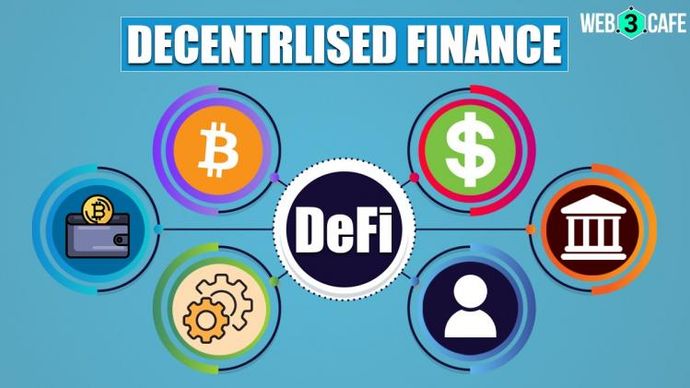What is decentralised finance? Know its benefits
Decentralised finance is gaining a lot of traction as this is one of the fastest-growing sectors in the blockchain space.

Highlights
- DeFi is based on secure distributed ledgers and avoids middlemen
- It uses uses cryptocurrency and blockchain technology to manage financial transactions
- It is permissionless, tranparent and offers instant lending access
Decentralised finance, popularly known as DeFi, is an emerging financial ecosystem based o based on secure distributed ledgers. Here, financial products are publicly available on a decentralised blockchain network. It lets users buy and sell assets as well as financial services as a form of investment or financing, thus avoiding the middlemen.
It must be noted that DeFi makes use of blockchain technology, which connects users without a central server and can transfer data and assets securely. Here, transactions are regulated under smart contracts that also use blockchain and run automatically when the parameters the parties set in advance are met. In other words, DeFi uses cryptocurrency and blockchain technology to manage financial transactions. It aims to democratise finance by replacing legacy, centralised institutions with peer-to-peer relationships that can provide a full range of financial services, be it everyday banking, loans, and mortgages, to complicated contractual relationships and asset trading.
In order to have in-depth knowledge of decentralised finance, let us in brief understand what is centralised finance.
Here in centralised finance, banks and third parties hold money, thereby facilitating the movement of money between parties and levying fees for using their services. Here, each entity in the chain receives payment for its services, for instance, a credit card charge starts from the merchant and moves to an acquiring bank, and so on. Moreover, it must be mentioned that in the case of centralised finance, all financial transactions are overseen in centralised finance, right from loan applications to a local bank's services.
Decentralised Finance, indeed, is being viewed both as a revolution and an opportunity, and has a profound influence on the way banks operate. Let us now look at some of the significant advantages and disadvantages of DeFi.
Pros of decentralised finance:
The DeFi movement aims at introducing various benefits for customers and investors. Some of the notable advantages of DeFi include:
Permissionless
One of the most striking features of DeFi is its decentralised nature. In fact, decentralisation is one of the basic tenets of blockchain, which helps in reducing the need to depend on corporations. This enables simple and effective access to financial services for every individual.
Transparency
Decentralisation offers better transparency, and the distributed ledger features information about all activities on the blockchain network, thus improving due diligence. In other words, DeFi provides transparency through the openness of blockchain data, which can be viewed by anyone at any time.
Good-bye to human error
Routine human errors have no place in DeFi, thanks to smart contracts. This greatly helps in minimising the financial crisis which occurs owing to the mismanagement of central banks and third-party intermediaries.
Instant lending access
Prior to the existence of DeFi, for availing of any loan, one had to physically go to the bank and had to undergo a tedious loan sanction process. However, this is not the case anymore with decentralised finance. With DeFi, one can receive a loan with only a few clicks as the growth of peer-to-peer lending and borrowing solutions has been significantly aided by this new-age technology.
Security
Financial data, which is one of the most sensitive information across the world, can now be safely stored with the help of DeFi. Here, data can be stored on hundreds or thousands of different nodes, thereby preventing hackers from attacking or breaking into the system to gain control. Its consensus protocols prevent any one participant in the system from harming the entire network.
A majority of risks associated with the DeFi project are related to the technology (blockchain) they are built upon.
A few of the cons related to DeFi include:
Responsibility
DeFi, though free of risks and issues, can still not be held responsible for one’s mistakes. In fact, it transfers responsibility from intermediaries to users. In other words, even if one loses funds by mistake, no one will be held responsible. Hence, creating some tools to prevent human errors and mistakes is strongly needed in the DeFi space.
Smart contract problems
Smart contract vulnerability also poses risks to several DeFi projects. If there is the slightest flaw in the code of a smart contract, it can lead to a loss of funds.
Though decentralised finance has its own share of pros and cons, however; undoubtedly, its advantages outweigh the disadvantages. In fact, the conventional benchmarks of financial services are poised to be transformed by decentralised finance, which has quickly emerged as a promising technology.
